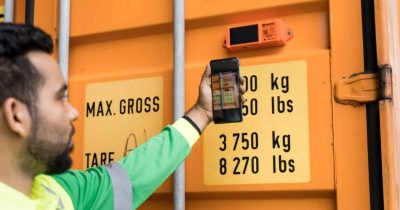Hapag-Lloyd has unveiled “Live Position,” a dry container tracking solution for logistics. This new offering gives customers unprecedented visibility, tracking their shipments from the point of departure to the final destination.
As the first container shipping line to implement a fleet-wide tracking system for dry containers, Hapag-Lloyd is cementing its role as a leader in integrating advanced IoT (Internet of Things) technology within the logistics sector. Over two-thirds of its dry container fleet is outfitted with these sophisticated tracking devices.
Real-time decision making
Real-time tracking allows businesses to know the exact location of their goods at any given time. This visibility is critical for managing supply chains efficiently, especially when dealing with sensitive or high-value cargo.
Companies can better plan their inventory and production schedules with accurate tracking data. This minimizes the risk of stockouts or excess inventory.
Here’s a scenario: A customer has loaded a dry container onto a vessel. Inside this container may be vital stoke needed to continue the manufacture of goods at a factory. The factory’s management team can stay updated on their container tracking and plan production and operations accordingly to ensure a smooth supply chain. The live tracking will also allow the factory to plan for potential delays.
Hapag-Lloyd COO Dr. Maximilian Rothkopf says: “It does close the blind spots of global logistics, enabling real-time decision-making and risk mitigation for our customers while allowing a more efficient steering of our fleet of boxes.”
Key features for logistics
The “Live Position” tool features a straightforward and intuitive interface, making it simple to search for information by container, booking number, or in batches. This tool gives customers a quick snapshot of their shipment’s current location, enabling them to make timely adjustments as needed.
Hapag-Lloyd has recently been working on innovative and sustainable ways of doing business. In October, the company introduced its ultra-large container ship Berlin Express. The vessel is fuelled by liquefied natural gas (LNG).
Red Sea crisis
The Red Sea crisis has seen shipping and logistics companies charter choppy waters in recent months. Hapag-Lloyd’s earnings saw a decrease in 2023 – something it expected.
The organization’s CEO Rolf Habben Jansen, said at the time of releasing its annual report: “We have got the current financial year off to a satisfactory start, but the economic and political environment continues to be volatile and challenging – especially in view of the current situation around the Red Sea. We therefore expect to see an overall decrease in earnings in 2024.”
The UK has particularly been affected by this event. The British Chamber of Commerce (BCC) released a report on the scale of the disruptions caused by the crisis. Almost 37% of companies surveyed in the report say they have been impacted by the Red Sea crisis.
To mitigate a “shock” such as this Red Sea crisis, the UK has set up a Critical Imports Council.
Photo Credit: Hapag-Lloyd
About the author
Sharl is a qualified journalist. He has over 10 years’ experience in the media industry, including positions as an editor of a magazine and Business Editor of a daily newspaper. Sharl also has experience in logistics specifically operations, where he worked with global food aid organisations distributing food into Africa. Sharl enjoys writing business stories and human interest pieces.












